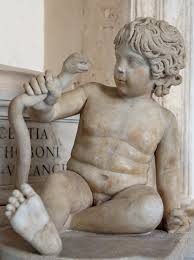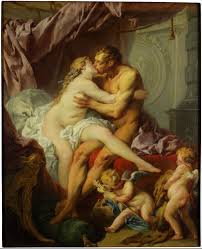In ancient Greece there was one man whose legend rose above that of everyone else. He was one of the few mortals whose fame equaled that of the gods themselves. Granted, he was a mythical figure, but unlike the gods, the fact of his own mortality meant that he could serve as an inspiration for the countless generations of men growing up. His strength, courage, confidence, and tenacity were all traits that were greatly admired among the Greeks.
His exploits showed that even mortals can achieve incredible things. Stories about him were recounted around countless fires. These tales were meant to educate young men on what it took to be a man right from childhood. Every Greek warrior going into battle had been raised on tales of this extraordinary hero. Men wanted to be him and women wanted a man like him. This man was Heracles.
Background on the myth
In today’s day, Heracles is better known under the name Hercules. However, Hercules is only the Latin version of his name, for the Ancient Romans also incorporated his legend into their own mythology. His image was so powerful that emperors like Commodus pretended to be him, thinking that this would give them his strength.
Ancient Greek mythology is a great source of inspiration and wisdom. In the ancient world, one of its chief purposes served to educate people (and not only entertain them), so each story often contained a moral or a lesson that the listener should take away. The myths that Heracles stars in are full of these types of lessons.
According to ancient legend, Heracles was born as the son of Zeus and Alcmene, a mortal woman. Zeus disguised himself as her husband and came to her in order to make love. Out of this union, Heracles was born. The story has a twist though. Alcmene’s real husband also came to her that night and out of that union was born Heracles’s twin brother, Iphicles.
This infidelity angered Hera, the wife of Zeus, and she would serve as the main source of trouble for Heracles. Throughout his life, she would try to hurt or kill him in a lot of ways, but always ended up unsuccessful.
Heracles was a man who could overcome any challenge thrown at him. This ability he demonstrated from a very early age. When he was eight months old, Hera tried to kill him by sending two snakes into his room. While his brother was crying, the little Heracles grabbed both snakes into his hands and strangled them. On the basis of this, the blind prophet Tiresias predicted a heroic future for the boy.
This prediction was fulfilled and Heracles, as one of the few mortals, grew to achieve immortality. At the end of his term, he was granted immortality and rose to take his place among the gods on Mt. Olympus.
However before this took place, he had to battle many enemies, pass through many obstacles and perform many heroic deeds. His travels took him to all corners of Ancient Greece and many places beyond.
The 12 Labors
Probably the most famous story about Heracles concerns the 12 labors he had to do. This particular story begins with him living a quiet family life with his wife and sons, but one day Hera casts a spell on him, driving him mad. In a fit of rage, Heracles kills his entire family.
Once he recovers from his madness, he is deeply saddened by what he has done and tries to find a way to atone for it. He goes to the Oracle of Delphi to try to ask for guidance. The Oracle tells him that he can atone for his sins by going to live in the court of King Eurystheus and do whatever the King asks of him.
Heracles reluctantly agrees to this. At the court, the King tells him that he has to perform 10 tasks:
1. Slay the Nemean lion
2. Slay the nine-headed Hydra
3. Capture the Golden Hind of Artemis
4. Capture the Erymenthian boar
5. Clean the Augean stables in one day
6. Slay the Stymphylian birds
7. Capture the Cretan bull
8. Steal the man-eating horses of the giant Diomedes
9. Obtain the girdle of the queen of the Amazons
10. Steal the cattle of the giant Geryon
When Heracles performed these 10 tasks, he stands in front of Eurystheus and asks for a pardon. However the cunning King makes an excuse to not accept two of the tasks and tells Heracles that he needs to perform two more tasks.
11. Steal the apples of the Hesperides
12. Descend into the underworld and capture Cerberus, the three headed dog who guarded the entrance into the land of the dead
Heracles didn’t hesitate and accomplished these two extra tasks.
The completion of these tasks assured Heracles his freedom. He would go on to many other adventures, such as joining Jason and the Argonauts on their quest to find the Golden Fleece. However, the 12 tasks alone were enough to grant him immortality.
Lessons we can use today
There are many lessons that we can learn from Heracles and his life. He was a troubled hero and his main weakness was that he could not control his emotions, often going into fits of rage. Heracles shows us that we should always have our emotions under control. If you don’t, you might come to regret it later.
Heracles also had many positive traits outside of his heroism. For the Ancient Greeks, he was a prime example of virtue and manliness, the Greek words for these qualities being “arete” and “andreia.”
“Arete” means virtue or excellence. It is something that all men strived for. It grew to encompass many meanings, but its initial and primary meaning was strength and courage. These are also the traits that the stories of Heracles were meant to primarily demonstrate.
Heracles always faced his challenges head on, he never wavered, never backed down. He faced the greatest threats that the mythical world could throw at a man, and he came out victorious. His courage was relentless and his strength was legendary.
The stories of Heracles were a way to encourage young men to be inspired by his enormous courage and to try to cultivate it within themselves. The Ancient world was full of war, full of different challenges, and a man needed to have courage and strength in order to survive. Luckily he had good examples to look up to. Whenever in doubt, whenever afraid, he could go back to the stories and ask himself: what would Heracles do?
Heracles also served as a prime example of “andreia”. This word can only be translated as “manliness.” “Andreia” meant the essence of the man, his raw strength and energy. As such, it was to be cultivated and grown. It is also the love of hard work and toil, always struggling to come out victorious. For a man has to struggle and work hard in order to be a man. There is no other way.
Heracles was also quite the ladies man. He was married four times and always acquired a lover wherever he went. One famous story has him arrive at the court of King Thespius, who asks him to kill a lion that has been ravaging the countryside. He does this and as a reward, King Thespius offers that he can make love to his daughters, all fifty of them! Heracles doesn’t hesitate and makes love to all of them, in one night!
If you need a hero to look up to, if you need to a bit of encouragement, if you need a bit of inspiration to work hard and overcome challenges, think of Heracles. He was a mortal who rose up to become immortal on the basis of his courage, hard work, self-discipline and strength.
It is more in accord with nature to emulate the great Hercules and undergo the greatest toil and trouble for the sake of aiding or saving the world, if possible, than to live in seclusion. — Cicero in “On duty”
Read more: The Speech To Save Your Life



“It is more in accord with nature to emulate the great Hercules and
undergo the greatest toil and trouble for the sake of aiding or saving
the world, if possible, than to live in seclusion.” — Cicero in “On duty”
More in accord with (fallen) nature to emulate Hercules. Doesn’t do you any good to conquer/save the world and lose yourself in passions (hump women in an orgy) like Hercules, who of course was done by his wife’s jealousy. Cicero had to have known better, Hercules had more in common with Mark Antony who Cicero mocked in his Philippics than a truely great man. Better to live seclusion and master yourself, than lose yourself, trying to (insert word here) the world, and be killed by a jealous woman because she knew very well you couldn’t control your own lust.
I never would have expected a Christian to admire Heracles anyway.
Nope.
50 bangs in one night… lets say one night is 12 hours… that’s 1 woman every 14 minutes… with no refractory period.
He must have abused his cialis and had several 4 hour erections.
Methinks Hercules ate fruit from the tree of the Golden Chubby. They are all over southern Greece.
What I can’t accept is a beta would actually be allowed, king or otherwise, to have fifty daughters. Let alone let an Super-alpha-alpha slay the vag of all of them. In one night, or several. Let’s face it, with a beta dad, be it Hercules in on e night, or hundreds of his troops, those “daddies girls” were going to get it slayed one way or the other.
Perhaps the mythological king was written to believe that a few of his daughters would not actually get it?
Either way, is it any wonder ugly feminists have tried to root out any mention of him in public schools? Unless he was the watered down Disney version?
How many wives does it take to have 50 daughters? If we say on average, half your children will be sons?
Back in the day, ancient kings used to have huge harems. Even quite recently the Emperors of Japan had a huge harem, and I think the Sultan of Brunei and the King of Swaziland have big harems.
Well he’s definitely my hero! What an awesome dude!
Gotta be a hero to slay that fattie Omphale.
Damn,you beat me to it
Yeah that was not his greatest moment 🙂 Of course there are also some parts of Heracles which should not be replicated (but that’s with any hero). You take the good parts and forget about the bad.
However the painting is from the Renaissance period. At that time they liked their women chubby.
Here is another statue of Omphale.
http://en.wikipedia.org/wiki/Omphale#mediaviewer/File:Dausch_Omphale_im_Fell_des_L%C3%B6wen_1.jpg
This is the statue of Omphale:
For thousands of years civilisations have understood and committed to legend the deep-seeded stuff that makes a man contented and happy in the true sense. This is principally the gist of what Joseph Campbell was talking about in his unifying works in mythology. Deep down we know how to be happy, but we’re at war with external elements and indoctrinated to effectively lobotomise ourselves and each other.
Today those elements are spoilt wives and girlfriends, McMansion mortgages, bratty kids, shitty unfulfilling jobs, debt slavery, society’s mind-numbing & wallet-emptying conventions, and so and so on. The list is fucking endless. Most men are emaciated, dishevelled wrecks. Even the more affluent ones. Seriously, look around you.
Purpose, adventure, the opportunity to demonstrate true courage and self-worth. These are the core of a man’s essence.
Modern life is tough for many however. Many, many men are emasculated, at home by their hen-pecking wives and in the workplace by dreadful female-led or feminised management.
Modern society itself is built on denying male pride to the vast majority of males. The only advice I can offer is steal it back while you’re young and have options.
When I was 20 I was sacked from a job for telling micro-managing, female mini-Hitler where to go. It was one of the greatest steps I ever took in terms of stealing back some pride for my life, and set me on a better path. I was worried for weeks as she was bullying and basically out to destroy me and pretty much everyone really, then I thought “fuck it, it’s a shitty borderline minimum wage job, quit the fuck out of it already. And tell her and her dickhead husband (he was her boss, the firm director) where to shove it”.
I did and 2 more followed right behind me in a mini-exodus. It pains me to think there are probably suckers still there 13 years later. Still taking orders from a vicious dried-up harridan. Lives, …entire worlds wasted. For what? Don’t fucking do it!
Have your own mythology. Your own story. Whether it be original or taken from various bits and pieces of others. Stick to it til the day you cough out your last breath.
Because jobs, situations, even money and women, will come and go regardless. Who cares about a shitty, replaceable job when you’re young? I see these kids working in Burger King, yeah sure if you’re a student just using the cash to buy pussy and booze at weekend, but otherwise what the fuck are you doing.
No man can be happy in such a role. The cognitive dissonance he has to foist on himself is probably enough to cause a brain haemorrhage. I read a few facts on male mental health a few years ago, and whilst it may be tempting to think people are too soft, it doesn’t surprise me that men are getting more and more depressed. Many of our lives are simply incompatible with how we should live. Like forcing an Atari game into a Nintendo. Something isn’t working.
“Heracles also served as a prime example of “andreia”. This word can only be translated as “manliness.” “Andreia” meant the essence of the man, his raw strength and energy”
So why was every greek girl in the north London school I went to called Andrea?
Since they are very masculine 🙂 Just kidding.
Andrea can be a male name in some languages as well, for example in Italian.
The Greek word is “ανδρεια” or andreia and this symbolizes the virtue of manliness and being courageous. I think it might come from “ανδρειος” or andreios, which is an adjective and means “manly”. However my Ancient Greek is weak, so people whose Ancient Greek is better than mine can clarify…
true, I seem to remember quite a bit of upper lip hair
– Andrea can be a male name in some languages as well, for example in Italian. –
True, this dude’s name is Andrea and he’s an Italian.
ἀνδρεία is the word for “manliness.” ἀνδρεῖος, α, ον, is the adjective meaning “manly, of or related to a man.” You can tell by the accentuation that in one we’re dealing with a long alpha, and in the other (when feminine), a short. It is probably more correct to say that ἀνδρεῖος comes from ἀνδρεία, and probably yet more correct to say that both come from ἀνήρ (man).
thanks!
This is a very good article, But we do not live in Greek mythological times.
Don’t be too sure.
You fail at comments
Greek boys had Hercules to look up to and become men, we have justin beiber. So beat that greeks.
They also had Achilles, Hector, Odysseus, Paris, Jason and others, and for the Greek kid that didn’t want to believe in mythical heroes, there were plenty of real ones, Leonidas ( this is Sparta !) , Pericles, Themistocles, and of course Alexandra the Great.
Yes, they had a lot of role models. 🙂
For me the greatest story is Anabasis however, because it concerns the courage of ordinary soldiers and how they made it home after travelling thousands of miles through hostile territory.
Mine is Jonas Savimbi.
True Baller.
Always loved Herakles myth. Regarding heroes and women, I like some other better; St. George and the Dragon
How could a common man, a low rank knight get a princess. By killing a Dragon. There is no other way.
common man gets a princess = (blue-beta) myth
Oh yeah baby, a brave, violent, rampant and relentless knight with the power of his sword to deliver death or spare life…is a beta man.
No doubbt.
– Heracles always faced his challenges head on, he never wavered, never backed down. He faced the greatest threats that the mythical world could throw at a man, and he came out victorious. His courage was relentless and his strength was legendary. –
All is true but if Heracles lives now at our day & age then sadly he’ll be reduced into the greatest and undefeated MMA Champion who ever grace this earth with his presence. The showbiz tycoons can even hold fights between him versus 30 Siberian Tigers or 25 saltwater crocodiles. But if Heracles shagged some cunts and later refused to upgrade their status any higher than cum-dumpsters then next thing he’ll know 1 of those cunts will cry rape and the mighty Heracles will be in chains or shot to death for resisting arrest at the hands of the state-funded white-knights (read : the police).
Looks like, even in mythology, man’s troubles are often caused by women.
The Romans called it Virtus(valor, manliness, excellence, courage, character, and worth) Which also became the creed of the European nobility. The True Right(as opposed to the Economic Right).